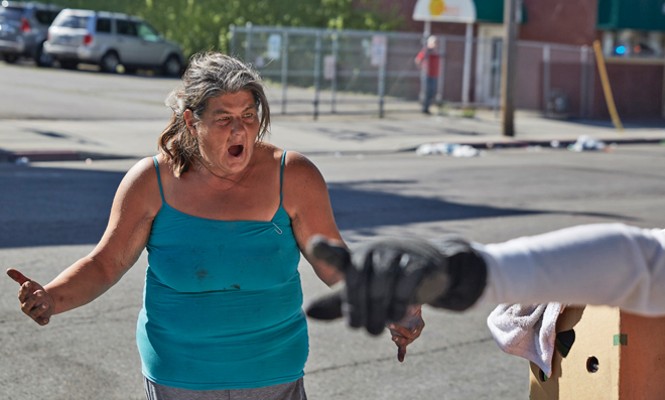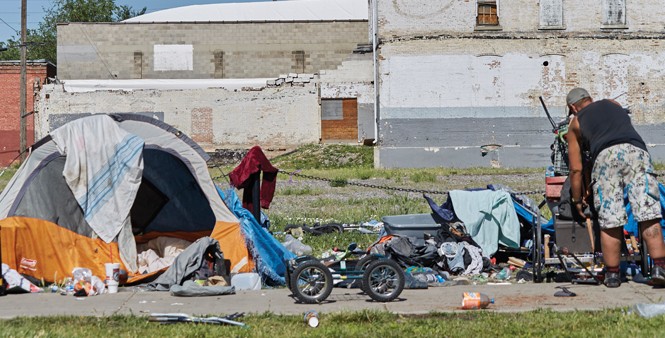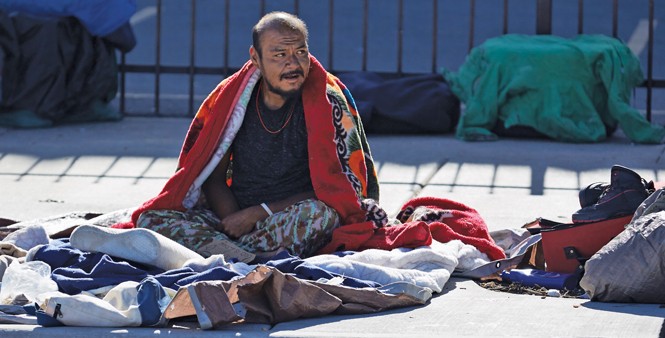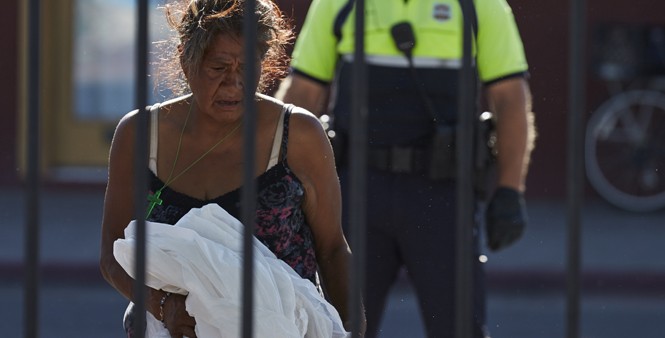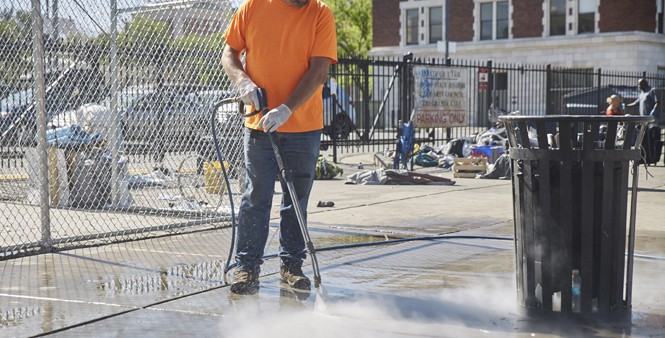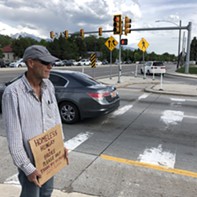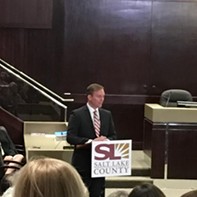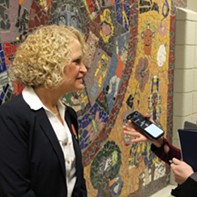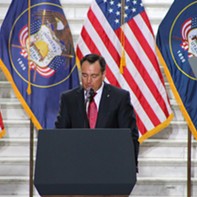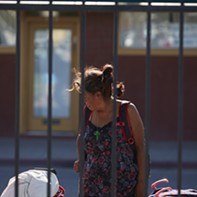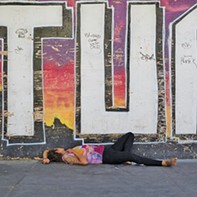Shelter War
In the fight over the future of the downtown homeless, the Pioneer Park Coalition looms large.
By Stephen Dark @stephenpdarkOn a Friday morning in early June in front of Salt Lake City's downtown homeless shelter, a tractor lowers its gaping bucket-jaw and scoops up a small mountain of soiled clothing piled in the gutter. Sneakers, rucksacks, panties; black, gray and brown rubbish bags full of clothing; food, and even a piece of paper with someone's recollection of "this one funny birthday story about you," are unceremoniously dumped into a truck.
For 20 years, the Salt Lake County Health Department has conducted cleanups in the area. It's only in the last two years that they've had to rely on heavy-lifting equipment, instead of just workers armed with shovels and brushes.
A department employee collects hundreds of used syringes along the median on 500 West behind the Rio Grande Depot. In the last few years, "the islands" have been overrun by homeless camps, drug use and criminality, along with people driving through the area to buy drugs.
The cleanups have taken on an even more somber tone with the recent decision by city and county leaders to shutter The Road Home.
As 24-year-old Michele packs her things to a soundtrack of backing-up trucks, she worries about an increasingly uncertain future.
"We're homeless," she says. "If they're going to kick us out of somewhere where technically we can stay, where do we go?"
As the downtown homeless face the prospect of, in essence, becoming homeless yet again, nonprofit the Pioneer Park Coalition, a longtime advocate for phasing out The Road Home, is far from resting on its laurels. Composed primarily of local business owners, the coalition in just three-and-a-half years has become a formidable policy voice, despite escalating concerns among homeless advocates about its pro-gentrification stance and volatile rhetoric.
Founder and developer Bryson Garbett and the coalition's frontman, former state Sen. Scott Howell, have long alleged the shelter fails the homeless by warehousing them and not using analytical data to better understand the problem—claims that homeless advocates ridicule as absurd. At the same time, the coalition blasts many of the homeless for, as Howell told Doug Wright on his radio show, "choosing to give up on life. ... It's a sad commentary." But it's not one, he continued, that taxpayers should be expected for pay for. Critics argue that Howell has relentlessly driven an at-best flawed narrative to ultimately push the homeless out of downtown, leaving politicians to pick up the pieces and find funding and replacement sites that somehow might absorb sub-populations of a burgeoning downtrodden community.
Nicole Thomas, one of a group of executive committee members that run the coalition, says, "We've been driving the dialogue, forcing conversation when conversation wasn't happening willingly. We've been that pesky little dog that keeps nipping away at their heels."
Through the coalition's political connections, particularly Howell's, and his bludgeoning-like use of press conferences, media stories, op-eds and tours of "the block," as the streets around the shelter are known, it has managed to turn tragic images of poverty, mental illness and vulnerability, along with anecdotes from life at the shelter, into a hammer with which to assail The Road Home.
Garbett gives full credit to his childhood friend Howell for the coalition's successes. "He's really the one, he's stirred things up, he's the one you're hearing about. He's the one that's effective." Howell contrasts the coalition to technology disruptors, changing "the way we think about homelessness today and what it should be for the future."
Howell's political connections include Speaker of the House Greg Hughes and Salt Lake County Mayor Ben McAdams, who was Howell's intern when the former was a law student at the University of Utah. In the intervening 20 years, McAdams says they weren't close but had more contact through the coalition. McAdams views the coalition as "having been particularly positive in highlighting some of the challenges we now face from kicking the can down the road far too long." But in the process, his and Howell's relationship became strained. "I've been frustrated by some of the tactics they've used," McAdams says, casting the coalition and its demands for the shelter's removal as "a blunt tool," rather than an advocate for finely tuned policy. "It's caused tension and coldness in our relationship, but we still talk."
The agency which operates the emergency shelter, The Road Home, largely has been silent. In an emailed statement, Executive Director Matt Minkevitch charts the ever-rising number of homeless across the Wasatch Front whom the shelter has helped, much of it swollen with the ranks of the mentally ill. From 2003-2008, The Road Home served 12,759 people. This year, it projects 8,400 will be sheltered.
Minkevitch acknowledges that the sheer volume of people along the Rio Grande corridor makes his agency and other service providers "easy targets for certain detractors. There are those who will blame the agencies serving people in need for the larger societal problems that cause these issues," he says. "It is easy work for anyone taking shots at a shelter or soup kitchen by blaming them for anyone in the area who misbehaves."
Salt Lake City Councilman Andrew Johnston gives the coalition credit for advocating for their neighborhood. But he still struggles with its claims to be proponents for best practices while at the same time criticizing both the homeless and service providers. "Do I trust them as a clear and honest voice for what's best for the homeless? No."
At times, the coalition can seem tone-deaf. After it was criticized for including anyone who attended their meetings as a coalition member, they continue to claim 650 members—many of whom might be surprised that their names are on the list. Howell also stoutly defends the coalition holding breakfast meetings at the Garden Café at the Grand America, courtesy of the hotel. "I don't care what they think," he says about those who contrast such a ritzy location with life at the Rio Grande. "Maybe they want us to meet down at Pioneer Park and get stabbed."
FRONT LINE PERSPECTIVES
Much of the momentum and energy that drives the coalition comes from business owners long frustrated with problems arising from the homeless milling around Pioneer Park.
One early June day, Tony Caputo's Market co-owner Matt Caputo has dealt with three people before 11 a.m. He had to remove a shoplifter, a speechless "zombie" with no shoes and tattered pants, and a man in a dirty tank top showing bruises and track marks on his arms. "Sometimes they go easy; sometimes not," he says.
At first, Caputo pursued a more physical approach with those who got in his face. But after his wife threatened divorcing him if that continued—she was concerned he might be shot after an altercation—he's chosen a more neutral approach. "This is my property. I worked hard for 15 years," he says about the renowned deli which directly faces Pioneer Park. "I'm within my rights to physically remove someone if they refuse to go."
His main concern, he says, is the safety of his young staff—some of whom have faced threats of violence—and customers. He doesn't know the world of politics, he says, keeping his militancy to his artisan-expert opinions on cheese and chocolate. "We're very supportive of trying something different." Caputo provides sandwiches for the coalition's meetings and moral support. "I have faith in them," he says.
On the other side of the park, social worker and activist Ryan Parker doesn't see the coalition in such glowing terms. "This shit has never once been about fucking people; it's always been about profits." While he works at The Road Home, the 27-year-old rapper who's lived through homelessness, addiction and poverty, says these are solely his own opinions.
The coalition, he says, "has been demonizing the area to help their cause to move it. I hold no fucking stock in them walking around showboating." Their condemnations of the quality of life of people on Rio Grande ignores how bureaucracy forms an enormous barrier in their lives, he says.
In 2015, ACLU of Utah met with The Road Home's management to try to understand some of the issues they are facing. "I think the people who work there, Matt Minkevitch included, are so frustrated at having their work constantly mischaracterized," ACLU of Utah's spokesperson Anna Thomas says. "The sense that they didn't have security, they don't have any rules, that's just not true. I think they feel like they're the easiest, most visible thing to point a finger at."
THE WELL-HEELED AND THE WELL-CONNECTED
The two friends at the heart of the coalition are a study in contrast. Garbett speaks softly, is cordial and deferential, even in his elegant offices-cum-mansion home he acquired from Karl Malone's wife which sits spitting distance to the south of the Capitol.
Howell, by contrast is a whirlwind of energy and voice, every inch the well-dressed and coiffured politician. He's prone to repeating phrases like "brothers and sisters" when talking about the homeless, and wearing his Mormon faith on his sleeve. "I don't think we can do a better thing than follow in the footsteps of the Savior in what we're trying to do now," he says.
Where Garbett is at times reticent, occasionally glancing at Howell as if for direction, Howell is push, push, push, refusing to take no for an answer. "He pushes," Garbett agrees. "He pushed some people hard—they think, too hard."
The coalition's roots lie in what Garbett describes as his fast-moving, $2-million purchase of land from developer Micah Peters that fronts onto Pioneer Park, a 10-acre grassland with tennis courts that Downtown Alliance's Chief Executive Jason Mathis says, should be "the jewel of the city." Having assumed he knew everything there was to know about Salt Lake City, Garbett was shocked to find the park awash with criminal activity and drug use. Before launching the nonprofit, he went to then-Mayor Ralph Becker's offices, only to be told there was nothing that could be done.
Garbett decided to set up an organization to advocate for addressing some of the issues he saw in Pioneer Park. He wanted "someone the city would listen to," so he turned to Howell, both his friend and the governmental lobbyist he employs for Garbett Homes.
Pioneer Park Coalition was incorporated as a nonprofit in January 2014, with Garbett as its chair and Howell as a 20-hour-a-week consultant initially paid $45,000 (his salary climbed to $60,000 in 2015). He's also listed as board trustee.
The group's mission, according to its tax filing, is to "improve the quality of the Rio Grande district by developing sustainable solutions for homelessness." That was to be achieved by "advocating for change with city and county leaders as well as with county mayors, police, service providers and media."
Howell worked his extensive contacts in the community, and quickly encountered aggrieved and frustrated Pioneer Park-located business owners such as Forrest McNabb who owns Big D Construction. McNabb told him of having to clean human waste off his business' doorstep every morning. Real estate businessman Josh Romney, who owns an office in Pierpont Place, recounted repeatedly finding used tampons on his doorstep. Pete Henderson, then owner of the Rio Café, raged against the violence and squalor that daily impacted his staff and kept away patrons.
Howell brought in people who would become the bedrock of the Pioneer Park Coalition's executive committee: Romney (who later ceased involvement); Gateway Bridal and Prom owner Nicole Thomas; and Tiffany Provost, owner of commercial properties adjacent to the park. Provost is a friend of Salt Lake City Mayor Jackie Biskupski and was on her housing transition team. That didn't stop Biskupski from turning her back on the coalition because she felt members had made unfair comments about her to the media, according to Howell.
City Weekly made several interview requests to the Mayor's Office and also emailed questions relating to this story but did not receive a response.
In those first few months, what they heard from senior community figures was that if they advocated for change, the homeless service providers would shut them down. "They'll just come after you, say, 'All you want to do is be a developer, to take this land away,'" Howell recalls being told. He continues that, "Not one of us have said anything about development. What we've said is, 'This is a hell of a mess.'"
UNDERCOVER
The then-fledgling coalition spent months investigating why criminal activity abounded at Pioneer Park. They learned, they say, the issue wasn't the park, but rather the downtown shelter.
In September 2014, Garbett donned an old pair of Levis, left his cell phone, ID and wallet behind, and lined up for a bed outside the shelter. The then-LDS bishop waited in line for three hours, watching a dealer at the block conduct dozens of drug sales through intermediaries. "I had no idea there was such a disgusting place," he says.
The first night, he was "so wimpy and naive," he says, he was shoved aside and ended up with a mat and a blanket and slept on the floor. The second and third night he slept on a cot, and later gave a $1,000 donation to The Road Home after he was criticized for taking up a desperately needed bed.
"I can't say that I know what it's like to be homeless," Garbett says. "After all, I could leave any time. I wanted to find out the services they provide." He came to the conclusion that The Road Home "warehouses" people, instead of providing services "to get them on their feet."
While The Road Home is primarily an emergency shelter—"set up to prevent people from freezing to death on the street," Crossroads Urban Centers' Associate Director Bill Tibbitts adds—other homeless-services providers point to a vast array of services geared to assisting the disabled, veterans, families and the elderly. According to numbers The Road Home provided City Weekly, 81 percent of all people who stay there receive some aid from at least one of 59 case managers.
Howell recognized in Garbett's solitary investigation a media opportunity. By Christmas, local dailies had picked up the story.
Among the 75 stakeholders Howell says he visited were service providers like Crossroads Urban Center. "We were told it would be a discussion about how to improve services," Tibbitts says. "So we wanted to be a part of that. Life doesn't have to be a zero-sum game. There's ways where things can be better for everybody."
The first monthly meeting of the coalition in 2015 at Big D Construction ran for more than two hours. Eighty scheduled speakers had three-to-five minutes to make their point in what resembled to onlookers a voluble community council meeting.
The coalition went to the Legislature in February 2015, seeking money for rapid re-housing. While Crossroads and The Road Home might have been expected to welcome such an initiative, the lack of any consultation about the locations the coalition proposed made both them and other agencies angry. "They presented a list of potential new social-service sites to the social services Legislature in the name of the coalition," Tibbitts says, but the sites were on the west side—something Crossroads and many others would not have agreed to if they had known. Howell dismissed the controversy as a misunderstanding.
Nevertheless, they got the $1 million and Howell says low-income units have gone up on North Temple from a mix of funding sources.
LEAD PIPE TO THE HEAD
While the coalition, Garbett says, has put little sustained effort into fundraising, its sources of money are opaque enough that board members have complained about lack of transparency. Their 990s show its first-year revenue to be $55,000, some of which was contributed by Garbett. In 2015, it jumped to over $1 million, most of which came from the Larry H. & Gail Miller Family Foundation and is earmarked for park improvements, Garbett says.
Late that year, Howell took his friend Greg Hughes on a tour of "the block." Speaker Hughes says Howell "understands how my brain works. There's been a value add for me working with the Pioneer Park Coalition and particularly Scott Howell."
Hughes witnessed a man crack another's head with a lead pipe. What upset him even more, however, was a nearby infant in a stroller. "I see these things, I draw conclusions in my own mind," Hughes says. He relies on Howell to "give me context behind what I'm seeing and what I'm worried about." The coalition, Hughes says, was a significant voice in his understanding of the issues surrounding the shelter and the needs of the homeless.
The coalition kept up the pressure on promoting new approaches to homelessness by bringing in consultant Robert G. Marbut. At a time when advocates nationwide are pushing for affordable housing units, Marbut promotes the idea of what he told a HuffPost reporter are "transformational campuses." Howell says Marbut's "move to transformation, versus a culture of warehousing, isn't mean. I think it's generous to say we're going to help you get back on your feet." One of Marbut's more controversial approaches that draws favor with Howell's emphasis on self-reliance, is rewarding good behavior, with consequences for misbehavior. If you're drunk, you sleep on a cement floor; if you've maintained sobriety, you get promotion to a studio.
Some of the coalition's more punitive ideas led to it locking horns with the ACLU in late May 2016 after coalition members approved a proposal to urge the city to hire more street cops, and target panhandling, camping and loitering. This was to tackle everything from street-side dealing to defecation in public and lewd behavior. Longtime local homeless guru Pamela Atkinson proposed cracking down on people handing out food to the homeless without permits.
That raised the hackles of the ACLU which a week later warned the city the coalition's proposals might draw civil rights lawsuits.
The coalition sought a meeting with the ACLU. Neither side was impressed by the other. "They're very challenging to work with," Howell says. "They want to give constitutional rights but only to people who fit their description." When he asked about the rights of homeowners and business owners faced with human waste on their front porch, he says, the ACLU told him to provide more restrooms.
The ACLU was equally frustrated. Thomas felt that "whatever we proposed to the Pioneer Park Coalition, it was never enough. And whatever they proposed violated people's civil liberties. I felt in some meetings the tenor and tone was so unproductive, there was no point in meeting with them anymore."
WILL SUCCESS SPOIL SCOTT HOWELL?
In November 2016, the city and county announced that the shelter would be closing. Then in February, Speaker Hughes huddled with city and county leaders behind closed doors to bring some closure to an increasingly fraught, volatile and divisive resource center site selection process. At a press conference, he announced two sites in the city, one in the county and a firm date for the shelter's closure: June 30, 2019.
If service providers had hoped that the coalition would lift their foot from the pedal with a closure date now set, the blood in the water seemed to only spur them on, albeit to the detriment of a six-month support contract they had inked with the Downtown Alliance.
Both share a long-term vision of the park as a centerpiece to downtown's future, yet cultural differences remain. While the coalition has consistently criticized service providers, the alliance, Executive Director Mathis says, "has been very careful not to villainize anyone, but instead focus on long-term strategies for success and solutions," such as expanding the Wiegand Center opposite The Road Home, which the coalition wants closed. If the coalition has sought largely to use media and political connections to push for change, the alliance's Pioneer Park focus has been most visible in its 25-year-old farmers market at the park and setting up of the Clean Team to provide and monitor toilets in the Rio Grande area.
Garbett says it was a good fit. "We have the ability to be a little more pushy, a little more bold, to make requests the alliance can't. An alliance doesn't work if you're offending your allies." But Mathis found the $30,000 contract to provide administrative and business support to the coalition increasingly challenging. "We try to be pretty disciplined and strategic," but the coalition "had a more laissez-faire approach to management and strategic thinking." Then, there was the coalition's appetite for public slap-downs. "It's a lot easier to get people to move in the same direction if it's a quiet private conversation without TV cameras or the threat of public humiliation," Mathis says.
The clash between the alliance's more cautious public culture and the coalition's more frenetic desire to engage issues publicly came to a head with the coalition's dogmatic backing of Sheriff Jim Winder's 21-point plan to solve the lawlessness on Rio Grande. "That was the real straw that broke the camel's back," Mathis says. "Their full-throated endorsement of the plan and our reluctance to embrace every element of it, fractured our partnership. I think they felt we were holding them back from being more strident and vocal."
After the coalition released Winder's plan to the media, critics were outraged at the proposal to move the bulk of the homeless to a tent camp a few blocks away. "Why would it be OK to have people in a camp instead of in The Road Home?" the ACLU's Thomas asks.
The ACLU became increasingly concerned that rhetoric was replacing policy. "We need to step back and take a breath," Thomas said on KRCL's RadioActive in April after Winder's plan hit the media. "The rhetoric over this neighborhood is so heated, the pressure so great, it also may be poisoning the well," for the resource centers.
DOWNTOWN RENEWED
Ask Howell about the need to address key issues such as trauma, mental illness and lack of treatment beds and deeply affordable housing units, he takes off his coalition hat and speaks for himself. He says his father taught him the best way out of depression was through service to others. When he hears concerns about how complicated things are, he says, his perspective is to tell those in need to think about giving back to the community, rather than asking for help.
The coalition still has issues to monitor, including the fate of service providers near The Road Home. Then, there's the decisions the Shelter the Homeless board will have to make about the future of the Rio Grande property, which it owns, and who gets to run the resource centers.
Much to the consternation of service providers, Josh Romney was elected to the board of Shelter the Homeless. Romney didn't respond to a call for comment. Howell takes heart that while the coalition's former financial chair is no longer with it, "he has been educated by his participation in the PPC to what the issues are."
Both Provost and Nicole Thomas advocate for changes in The Road Home's approach to managing shelters and, in Provost's case, she raised the question with the Deseret News editorial board whether the agency that provides emergency shelter and housing for much of the Wasatch Front's homeless population should run the resource centers.
In his statement to City Weekly, Minkevitch urges both collaboration and access to housing and health care. "The dialogue must rise above simply closing the downtown shelter. We must work together to develop a critical mass of deeply affordable housing, as well as greater access to comprehensive health care for those who are currently going without."
Social activist Parker takes a bleak long-term view of the impact on the homeless of the policies the coalition has pushed so hard for. "Ten years from now, at this rate, they'll make Rio Grande into condominiums and coffee shops, housing; there'll be cute families, very little police calls. And they'll say, 'We did it.'" All they will have done, he argues, is move the problem elsewhere, though it won't be at the expense of developers, their consultants and politicians. "It's going to be at the expense of the 60-year-old man waiting in line at a shelter. He's going to be the one bearing the cost," he says.
Nicole Thomas says the coalition is not saying move the homeless and forget about them. Rather it's a quest for a solution that benefits everyone—Howell's "brothers and sisters" included.
"I still love downtown, I still love the meaning of it all," she says. "At the end of the day, everyone's heart is in it, too. I have to make a profit; I have to be successful. The only thing in it for me is a safer, cleaner downtown."
More by Stephen Dark
-
Call it a Comeback
Long mired in economic depression, Midvale’s Main Street dusts off its small-town charm.
- Sep 20, 2017
-
Love Letters
Correspondence between a young woman at the Topaz internment camp and her beloved sheds light on Trump's America.
- Sep 6, 2017
-
Triggered
Veterans Affairs exists to help vets. So why did the Salt Lake VA appoint an anti-veteran chief?
- Aug 30, 2017
- More »
Latest in Cover Story
Readers also liked…
-
Forget the family pedigree—Robert F. Kennedy Jr should not be the next president of the United States
Trojan Horse
- Jun 21, 2023
-
Women decry harassment and toxic culture at St. George auto dealership
Men at Work
- Oct 11, 2023


